Cockatiels, with their charming personalities and vibrant plumage, make wonderful feathered companions. To keep these intelligent and social birds happy and engaged, providing them with the right toys is paramount.
In our blog post, “Feathered Fun: Choosing the Best Toys for Cockatiels,” we’ll explore the world of avian enrichment, guiding you through the process of selecting the perfect playthings for your beloved cockatiel.
Cockatiels are renowned for their playful nature and natural curiosity. The right toys can stimulate their minds, encourage physical activity, and prevent boredom-related issues. However, choosing the ideal toys requires consideration of safety, materials, and your bird’s unique preferences.
Join us as we delve into the exciting realm of cockatiel toys, sharing valuable insights and creative ideas to help you provide hours of entertainment for your feathered friend.
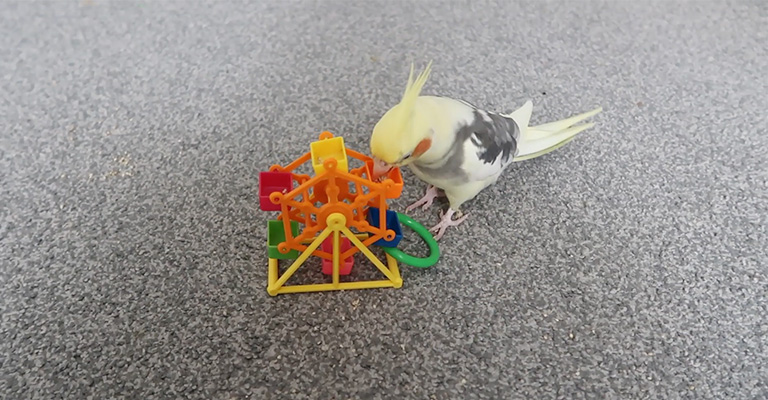
Cockatiel Playing Behavior
Cockatiels, prized for their intelligence and sociability, rely on play behavior to lead a fulfilling life. These birds are inherently active and curious, requiring mental stimulation and physical activity to stay happy and healthy.
Play serves as a vital outlet for their energy and instincts. It prevents boredom, alleviates stress, and reduces the risk of behavioral issues like feather plucking or excessive screaming. To cater to their playfulness and well-being, providing a range of stimulating toys is essential.
These toys not only keep them engaged but also mimic the challenges they face in their natural habitat, ensuring a contented and thriving pet cockatiel.
Importance of Toys For Cockatiels
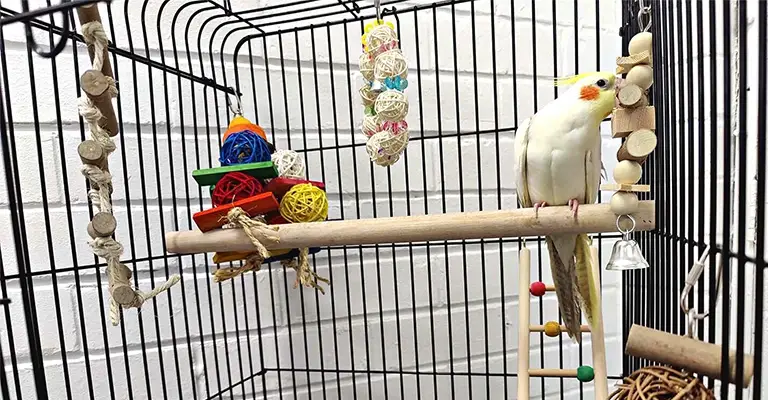
First, we’ll talk about the importance of toys for cockatiels.
Mental Stimulation
Toys are not just playthings; they are essential tools for keeping your cockatiel mentally engaged. These intelligent birds thrive on stimulation, and without it, they may become bored.
Boredom can lead to a host of behavioral issues, such as feather plucking or excessive screaming. Toys offer mental challenges, puzzles, and tasks that keep their minds active and help prevent these negative behaviors.
Physical Activity
Cockatiels are naturally active birds. In their natural habitat, they fly, forage for food, and engage in various physical activities daily. When kept in captivity, it’s vital to provide them with opportunities for physical exercise.
Interactive toys like swinging and climbing toys encourage them to stay active and maintain a healthy weight. This physical activity also contributes to their overall well-being.
Emotional Enrichment
Cockatiels are known for their sensitivity and social nature. They can form strong emotional bonds with their owners. However, when they are alone for extended periods, they can experience loneliness and stress. Toys can serve as emotional outlets for them.
They offer comfort and a sense of security, reducing stress and anxiety, especially when their human companions are not present.
Social Interaction
Cockatiels are social creatures that thrive on interaction with their flock members, which can include their owners. When you’re away from home or busy with other responsibilities, it’s essential to provide toys that mimic social interaction.
Some toys, like mirror toys, can give the illusion of a companion bird, helping your cockatiel feel less lonely during your absence.
Types of Toys for Cockatiels
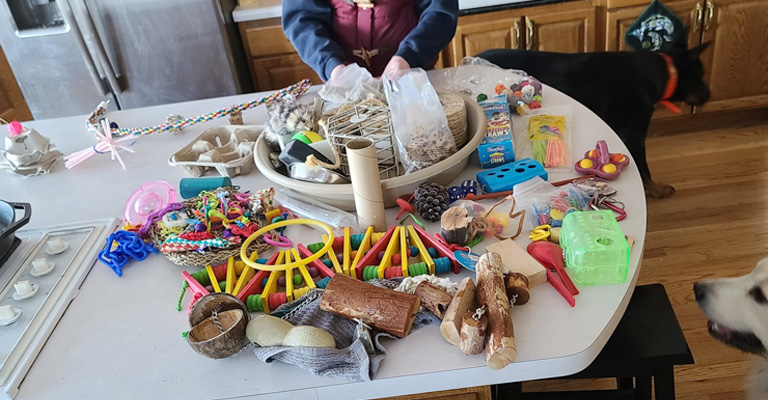
Now let’s check out the types of cockatiels
Chew Toys
Chew toys are made from safe materials like wood and are designed to satisfy a cockatiel’s natural urge to chew. Chewing is not only a pleasurable activity for them but also helps prevent beak overgrowth, a common issue in captive birds. These toys provide both mental and physical stimulation.
Foraging Toys
Foraging toys are designed to stimulate your cockatiel’s problem-solving skills. They usually have hidden compartments where you can place treats or food items. Your bird must figure out how to access these rewards, making for a fun and engaging activity.
Swinging and Climbing Toys
Swinging and climbing toys encourage physical activity by allowing your cockatiel to swing and climb, mimicking their natural habitat. These toys offer opportunities for exercise and entertainment, helping to keep your bird in good physical shape.
Noise-Making Toys
Bells, rattles, and musical toys appeal to a cockatiel’s sense of sound. These toys provide auditory stimulation and can be especially enjoyable for birds that respond positively to musical or rhythmic sounds.
Mirror Toys
Cockatiels are highly social birds and may enjoy looking at their reflection in a mirror toy. However, it’s important to use these toys in moderation to avoid overbonding with the reflection, which can lead to behavioral issues.
Interactive Puzzles
Toys with moving parts or puzzle elements challenge cockatiels mentally and keep them engaged for extended periods. These toys can be particularly useful in preventing boredom and encouraging problem-solving skills.
DIY Toys for Cockatiels
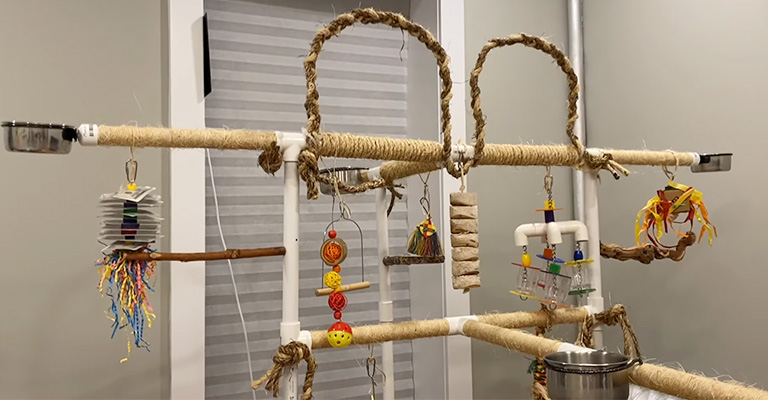
Creating DIY toys for cockatiels can be a fun and rewarding way to provide enrichment and mental stimulation for your feathered friend. Here are eight ideas for DIY toys that will keep your cockatiel entertained:
Paper Shredder Fun
Cockatiels love to shred paper. Provide them with old newspaper or plain paper and hang it in their cage. You can even create a paper chain by threading strips of paper through a piece of string or twine. They’ll enjoy tearing it to bits, and it’s an excellent way to recycle old newspapers.
Popsicle Stick Puzzles
Gather some clean popsicle sticks and paint them with bird-safe, non-toxic colors. Once they’re dry, arrange them in various patterns or stack them to make a small tower. Your cockatiel will have a blast dismantling and rearranging the sticks.
Foraging Boxes
Create foraging opportunities by placing treats or pieces of their favorite fruits and veggies in small cardboard boxes. Your cockatiel will enjoy the challenge of opening the boxes to get to the goodies inside.
Bell Bonanza
Attach a few small bird-safe bells to a piece of string or chain and hang it in the cage. The tinkling sound will pique your cockatiel’s curiosity, and they’ll enjoy playing with the bells.
Feathered Friends Mobile
Hang colorful feathers from a small hoop or a piece of string and suspend it in the cage. Cockatiels love to preen and play with feathers, so this DIY toy will be a hit.
Fruit Kabobs
Skewer small pieces of bird-safe fruits (like apples, grapes, or berries) onto a wooden or stainless steel kabob stick. Make sure it’s securely attached to the cage bars. Not only will this provide a tasty treat, but it also doubles as a toy as they work to nibble the fruit off.
Beaded Strings
Thread bird-safe plastic or wooden beads onto a piece of string or leather cord and hang it in the cage. Cockatiels are attracted to bright colors and textures, and they’ll enjoy manipulating the beads with their beaks and feet.
Paper Bag Hideout
Place a clean, small paper bag in the cage. Cut a few holes in the bag for your cockatiel to peek through and crawl in and out of. They’ll enjoy the privacy and the crinkly sound of the bag as they explore it.
Remember to always prioritize your cockatiel’s safety when creating DIY toys. Ensure that all materials are non-toxic, and regularly inspect the toys for wear and tear to prevent any potential hazards.
Additionally, rotate and vary the toys to keep your cockatiel engaged and mentally stimulated. DIY toys are not only cost-effective but also provide a great way to bond with your feathered companion while promoting their physical and mental well-being.
Things to Consider While Choosing Toys for Cockatiels
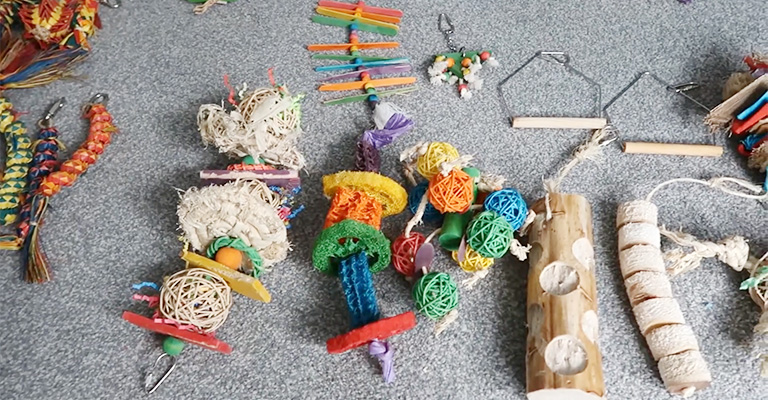
When selecting toys for your cockatiel, it’s essential to consider their physical and mental stimulation needs, as well as their safety. Here are several factors to keep in mind:
Material Safety
Ensure that the toys are made from bird-safe materials. Avoid toys with small parts that can be easily chewed off and swallowed, as these can pose choking hazards. Look for toys made from non-toxic, bird-safe materials such as stainless steel, untreated wood, and food-grade plastics.
Size and Shape
Cockatiels have small beaks and feet, so choose toys that are appropriately sized for them to manipulate and interact with comfortably. Toys that are too large or too small may not hold their interest.
Variety
Offer a variety of toys to keep your cockatiel mentally engaged. This can include toys that encourage chewing, shredding, swinging, climbing, and problem-solving. Rotating toys every few weeks can also help prevent boredom.
Textures and Colors
Cockatiels are attracted to a range of textures and bright colors. Toys with different textures like bells, mirrors, ropes, and textured perches can provide sensory stimulation. Vibrant colors can capture their attention and interest.
Chewable Items
Cockatiels have strong beaks and enjoy chewing. Toys made of natural materials like untreated wood, palm leaf, or coconut shells can satisfy their chewing instinct. Be sure to replace these toys when they become too worn to prevent splinters or ingestion of small pieces.
Interactive Toys
Invest in toys that encourage problem-solving and mental stimulation. Puzzle feeders or foraging toys that hide treats or food can keep your cockatiel engaged while fulfilling their foraging instincts.
Noise and Sound
Some cockatiels enjoy toys that make noise, like bells or musical toys. However, be mindful of the noise level, as excessively loud toys may stress your bird.
Safety Features
Check that toys are securely constructed, with no sharp edges or loose parts that could injure your bird. Toys with metal hooks or clips should be made of stainless steel to prevent rust.
Age and Activity Level
Consider your cockatiel’s age and activity level when choosing toys. Young and active birds may require more complex and physically demanding toys, while older or less active birds might prefer simpler, more soothing toys.
Supervision
Always supervise your cockatiel when introducing a new toy. Some birds may be initially hesitant or frightened by new objects. Ensure that the toy doesn’t cause stress or anxiety, and gradually introduce it to your bird’s environment.
Cleanup and Maintenance
Keep in mind that toys can get soiled or damaged over time. Regularly clean and inspect toys to prevent any potential health issues or accidents.
Social Interaction
Some toys can promote social interaction between you and your cockatiel. Toys that allow your bird to play with you, such as toys on the outside of the cage or interactive games, can strengthen the bond between you and your feathered friend.
Remember that every cockatiel is unique, so it may take some trial and error to find the toys that your bird enjoys the most. Pay attention to your cockatiel’s preferences and adjust their toy selection accordingly to ensure their physical and mental well-being.
Maintaining and Cleaning Cockatiel Toys
Properly maintaining and cleaning your cockatiel’s toys is essential for their health and well-being, as dirty or damaged toys can pose health risks. Here’s a step-by-step guide on how to maintain and clean cockatiel toys:
Regular Inspection
Regularly inspect your cockatiel’s toys for signs of wear and damage. Check for loose parts, frayed ropes, or broken components that could potentially harm your bird.
Remove Soiled Toys
If a toy becomes soiled with feces, food, or other substances, remove it from the cage immediately to prevent the risk of contamination or bacterial growth.
Clean Non-Porous Toys
Non-porous toys, such as plastic or metal, can be cleaned by soaking them in a mild bird-safe disinfectant solution, like a diluted vinegar and water mixture or a specialized pet-safe disinfectant. Follow the manufacturer’s instructions for cleaning if available.
Scrub and Rinse
Use a soft brush or cloth to scrub the toys gently to remove any dirt or residue. Rinse them thoroughly with clean water to ensure no cleaning residue is left behind.
Drying
Allow the cleaned toys to air-dry completely before returning them to the cage. Ensure there is no moisture left on the toys, as damp toys can harbor bacteria.
Disinfect Porous Toys
Porous toys, like untreated wooden toys or natural fiber toys, require special care. You cannot soak them in water as they may absorb moisture and become a breeding ground for bacteria. Instead, use a bird-safe disinfectant spray to clean them.
You can find these sprays at pet stores or make one at home by diluting a bird-safe disinfectant with water and lightly misting the toys. Let them air-dry thoroughly.
Rotate Toys
To prevent boredom, regularly rotate your cockatiel’s toys. This keeps their environment stimulating and prevents them from becoming disinterested in their toys.
Dispose of Damaged Toys
If a toy becomes significantly damaged or unsafe for your bird to use, dispose of it properly. This prevents any potential harm to your cockatiel.
Wash Perches and Cage Bars
Don’t forget to clean perches, cage bars, and other cage accessories. These areas can accumulate droppings and bacteria. Scrub them with a bird-safe disinfectant and rinse thoroughly.
Maintain Hygiene Routine
Establish a regular cleaning schedule for your cockatiel’s toys and cage accessories. Depending on your bird’s activity level and cage conditions, this may be weekly or monthly.
Wash Your Hands
Always wash your hands thoroughly with soap and water after handling your cockatiel’s toys or cleaning their cage to prevent the spread of any potential germs.
Observe Your Bird
Pay attention to your cockatiel’s behavior and health. If you notice any signs of illness, such as changes in appetite, activity level, or droppings, consult with an avian veterinarian promptly.
Maintaining clean and safe toys for your cockatiel is crucial for their overall health and happiness. Regular cleaning and proper hygiene practices will help keep your feathered friend in top condition while ensuring they enjoy their playtime to the fullest.
FAQs
Cockatiels enjoy a variety of toys, including swings, bells, mirrors, and puzzle toys. Natural wood and shreddable toys are also great choices to satisfy their chewing instincts.
It’s best to use toys specifically designed for birds. Baby toys may contain materials or small parts that could be harmful to your cockatiel if ingested.
Rotate toys regularly, ideally every week or two, to keep your cockatiel engaged and prevent boredom. This encourages mental stimulation and prevents them from losing interest in their toys.
Yes, toys made of safe, hard materials like calcium blocks, mineral chews, and textured perches can aid in beak maintenance and keep it from growing too long.
Observe your cockatiel’s behavior. If they interact with a toy, play with it, or show curiosity, it’s likely a favorite. Conversely, if they ignore or avoid it, it may not be to their liking. Tailor their toy selection based on their preferences.
Wrapping Up
In the world of cockatiels, a well-chosen toy can be the key to a happy and healthy bird. Our exploration of cockatiel toys has revealed the importance of safety, variety, and mental stimulation.
By investing time and effort into selecting and maintaining the right toys, you not only keep your feathered friend content but also strengthen the bond between you and your avian companion.
Remember to monitor your cockatiel’s interactions with toys, rotate them regularly, and prioritize safe, non-toxic materials. From colorful chewables to interactive puzzles, the world of cockatiel toys is rich with options to keep your pet entertained and engaged.
So, whether you’re a first-time cockatiel owner or a seasoned avian enthusiast, remember that choosing the best toys for your cockatiel is an investment in their happiness and well-being. Happy bird, happy owner!